Top 11 Best Competitor Analysis Tools On The Market Right Now
Competitor analysis tools offer you insights you can use to gain a competitive advantage. Discover a detailed list of the most powerful apps.


I have never understood why anyone would pay hundreds or even thousands of dollars for a bloated competitive analysis tool with ‘advanced features’ they’ll never even use.
The issue isn’t whether these platforms work (most of them do); it’s whether they actually fit the current business needs.
When I helped a B2B startup plan a social media content strategy on a tight budget, I needed a tool that delivered solid competitor insights at an affordable price, without forcing us to pay for 30+ extra features we didn’t need. That experience made it clear just how important it is to choose a tool that matches your goals, team size, and budget.
In this guide, I break down the top competitive analysis tools, with comparisons, pricing, and feature breakdowns to help you figure out which ones are worth your time, and which ones aren’t.
Key takeaways:
-
Competitive social media analytics & listening tools: Best when you need deep, cross-channel competitor insights (content, benchmarks, alerts, reporting) without the bloat of an all-in-one suite.
-
PPC & advertising intelligence tools: Ideal for uncovering competitors’ ad keywords, copy, and creative patterns to sharpen targeting and improve ROI—though many skew to specific platforms.
-
SEO & content competitive analysis tools: Perfect for exposing keyword and content gaps, backlink strategies, and technical wins so you can beat rivals in search with focused, scalable efforts.
Competitive social media analytics and listening tools
Socialinsider
Socialinsider is an AI-powered social media analytics and benchmarking tool designed for deep competitive analysis.
It offers cross-channel insights into competitors’ social media performance by aggregating data from platforms like Facebook, Instagram, LinkedIn, TikTok, and more. The tool provides historical comparisons, industry benchmarks, and custom reports that help marketers identify content gaps and refine their strategies. You can track all the main social media metrics for your competitors, including:
- Followers and follower growth
- Engagement and engagement rate
- Number of posts
- Reach
- Impressions/ views
- Comments
- Shares
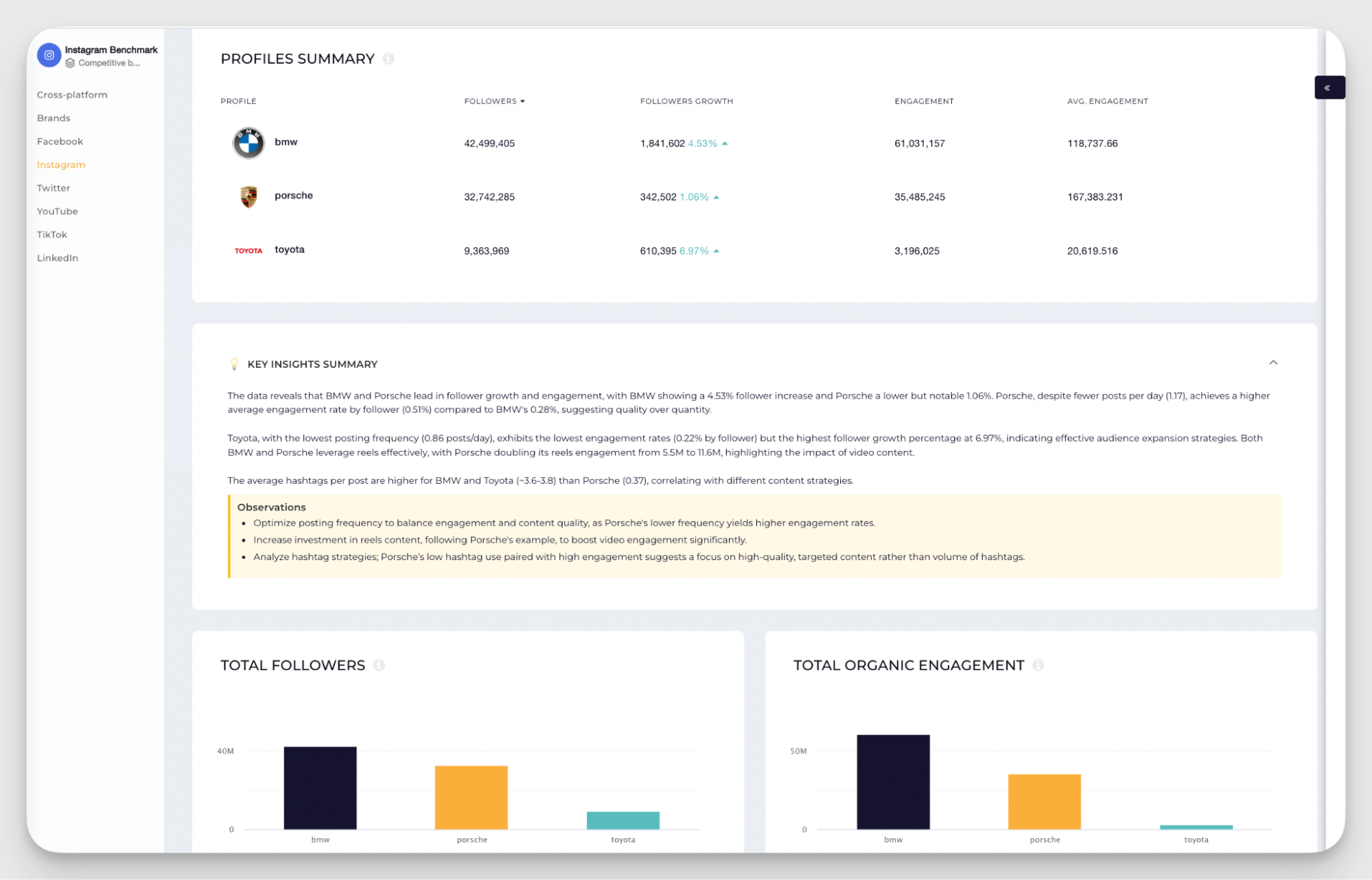
Key features of Socialinsider
- Competitor content performance tracking:Socialinsider makes it easy to track how competitors perform across different channels. You can dive into metrics like post frequency, content mix, follower count, growth trends, engagement rates, impressions, and reach. It's also possible to group a competitor's different social media profiles under a dedicated brand. In the end, you get aggregated, cross-channel insights and a full picture of your competitor’s strategy in one place, just like in the example below.
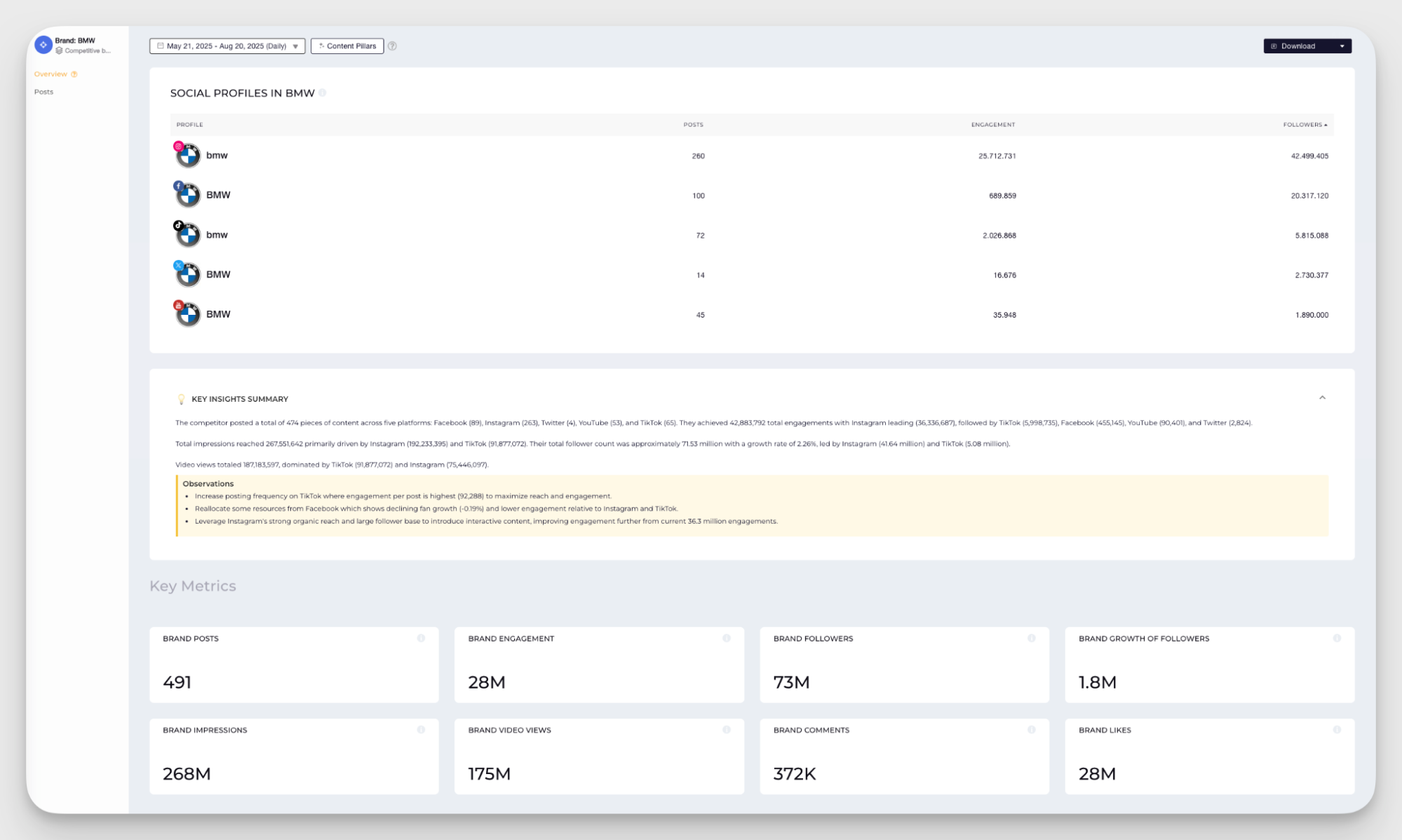
Content tagging and analysis: Socialinsider uses AI to automatically tag posts under different content themes or pillars. You can also create custom content pillars and manually tag posts to track content performance. This makes it easy to spot top-performing hashtags, recurring themes, and best-performing posts across your niche.
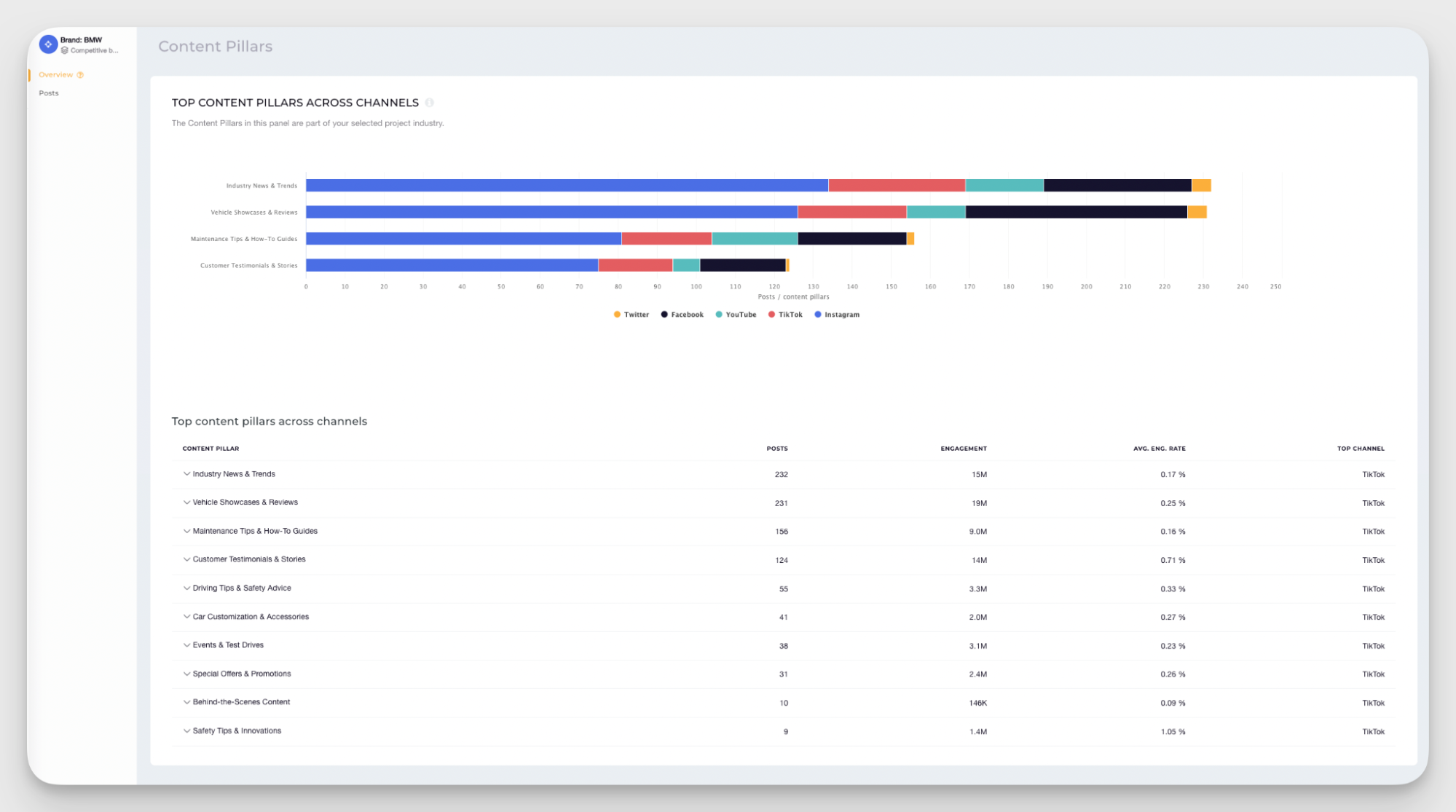
- Audience growth tracking: The tool provides both real and estimated follower growth trends (beyond what native APIs often allow). You can monitor steady growth vs sudden spikes, investigate what drove those changes, and compare audience expansion across multiple competitors or industry benchmarks.
- Posting schedule optimization: Socialinsider also offers insights into when and how often competitors post their highest-performing content. You can use the data to refine your own publishing strategy by aligning with proven audience engagement windows.
Strengths and limitations
Most suited for:
It is a powerful tool for agencies, brands, and medium-to-enterprise businesses that want to understand both their direct competitors and broader industry trends.
Why choose Socialinsider
If you’re looking for a comprehensive social media competitive analysis platform with advanced insights, Socialinsider is the one.
Socialbakers (Emplifi)
Socialbakers was rebranded as Emplifi in June 2021 after its acquisition by Astute. It is an enterprise-grade social media management platform. It analyzes data across owned, earned, and paid channels in one place, allowing you to compare your performance directly with your competitors.
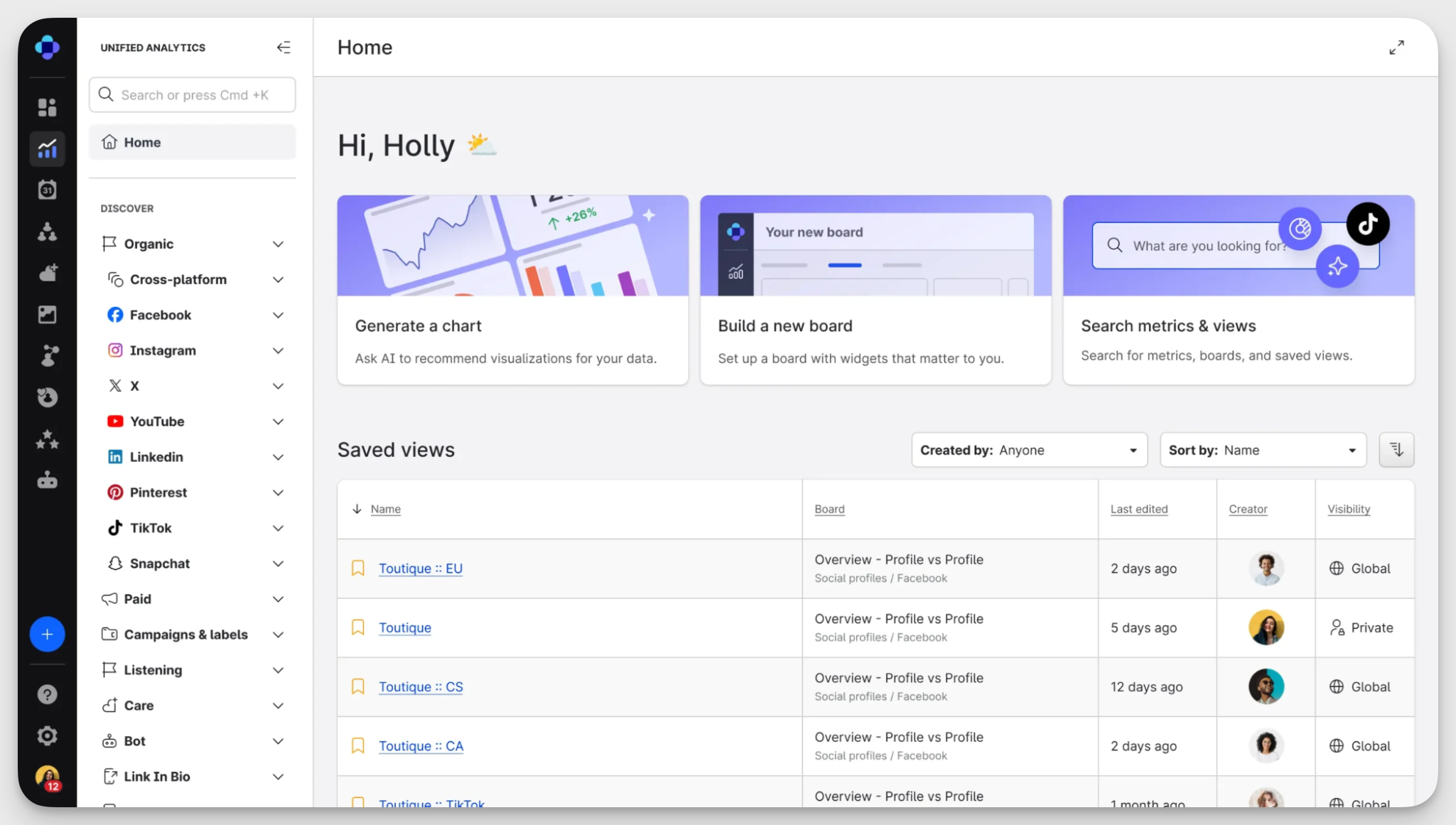
Key features of Socialbakers (Emplifi)
- Competitive benchmarking: Emplifi allows you to compare your performance with competitors across multiple channels. You can see how your social media campaigns stack up in terms of reach, engagement, and audience growth–even identify areas where you may be falling behind.
- Content optimization: Emplifi can also help identify which types of content published by your competitors resonate most with audiences. This helps benchmark your audience against your competitors—spotting whether they’re growing faster, driving deeper engagement, or generating more positive sentiment.
- Audience insights: The platform provides a complete view of your audience by analyzing follower growth, engagement behavior, and sentiment trends. This helps brands understand who they’re reaching and how to adjust content for maximum impact.
- ROI measurement: Emplifi connects performance data with business outcomes, so you can see how your social campaigns contribute to revenue, conversions, or customer retention. Automated social media reports make it easier to share results with stakeholders.
Strengths and limitations of Socialbakers (Emplifi)
Most suited for:
Socialbakers can suit enterprise businesses and large agencies that need advanced social media analytics and performance tracking.
Why choose Socialbakers (Emplifi)
It’s an enterprise-level solution for social media competitive intelligence, built for large brands and agencies that need deep analytics and robust benchmarking at scale.
Keyhole
Keyhole is a social media monitoring and analytics tool that helps brands track conversations, discover influencers, and measure campaign performance in real time. While it lacks some of the advanced benchmarking and reporting of enterprise tools, it can be a good option for small teams focused mostly on hashtag campaigns and influencer-driven strategies.
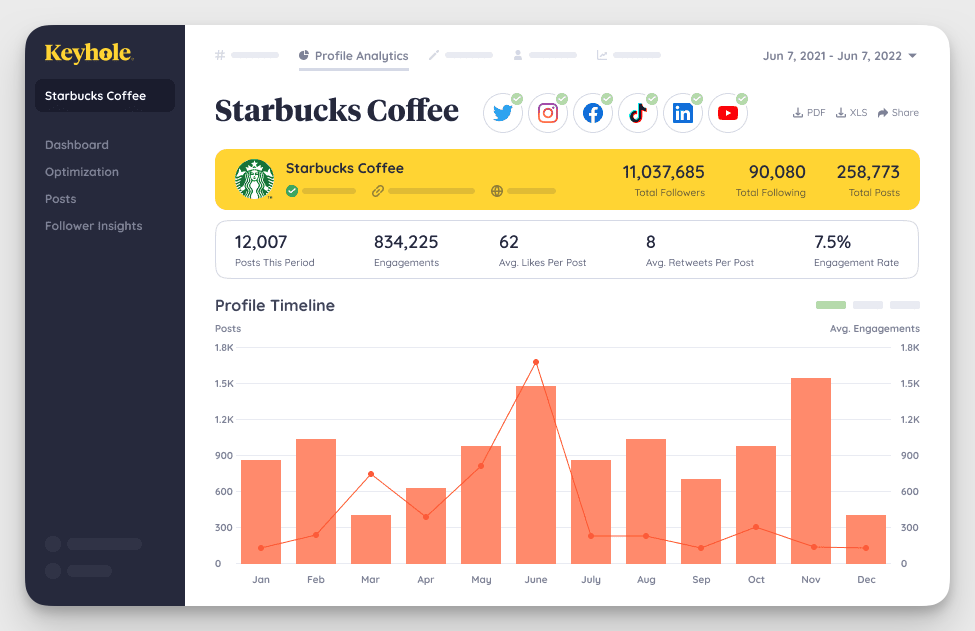
Key features of Keyhole
- Competitor hashtag tracking: Keyhole specializes in hashtag analytics, allowing you to monitor trending hashtags, measure their reach, and compare how competitors use them in campaigns. You can use the insights to identify high-performing hashtags, track audience engagement, and adjust your content strategy on the fly.
- Influencer discovery: The tool makes it easy to find influencers by ranking them with an influence score based on reach, engagement, and popularity. It also visually maps out networks of influential accounts discussing your niche, brand, or competitors–making it easy to identify micro, macro, or nano influencers aligned with your campaign goals.
- Campaign monitoring: You can track live campaigns in real time, from hashtag performance to audience engagement. You can also set up alerts for spikes in mentions or sentiment shifts.
Strengths and limitations of Keyhole
Most suited for:
Keyhole is most suited for small to medium businesses that want to run hashtag-focused campaigns, track influencer performance, and measure real-time engagement without the complexity of enterprise tools.
Why choose Keyhole
It’s the best tool for hashtag-focused competitive analysis and real-time campaign tracking.
Meltwater
Meltwater is a media monitoring and competitive intelligence tool that tracks conversations everywhere–social media, news outlets, blogs, forums, and even print. Its AI-powered analytics help brands keep an eye on competitors, manage their reputation, and measure the real impact of PR and earned media.
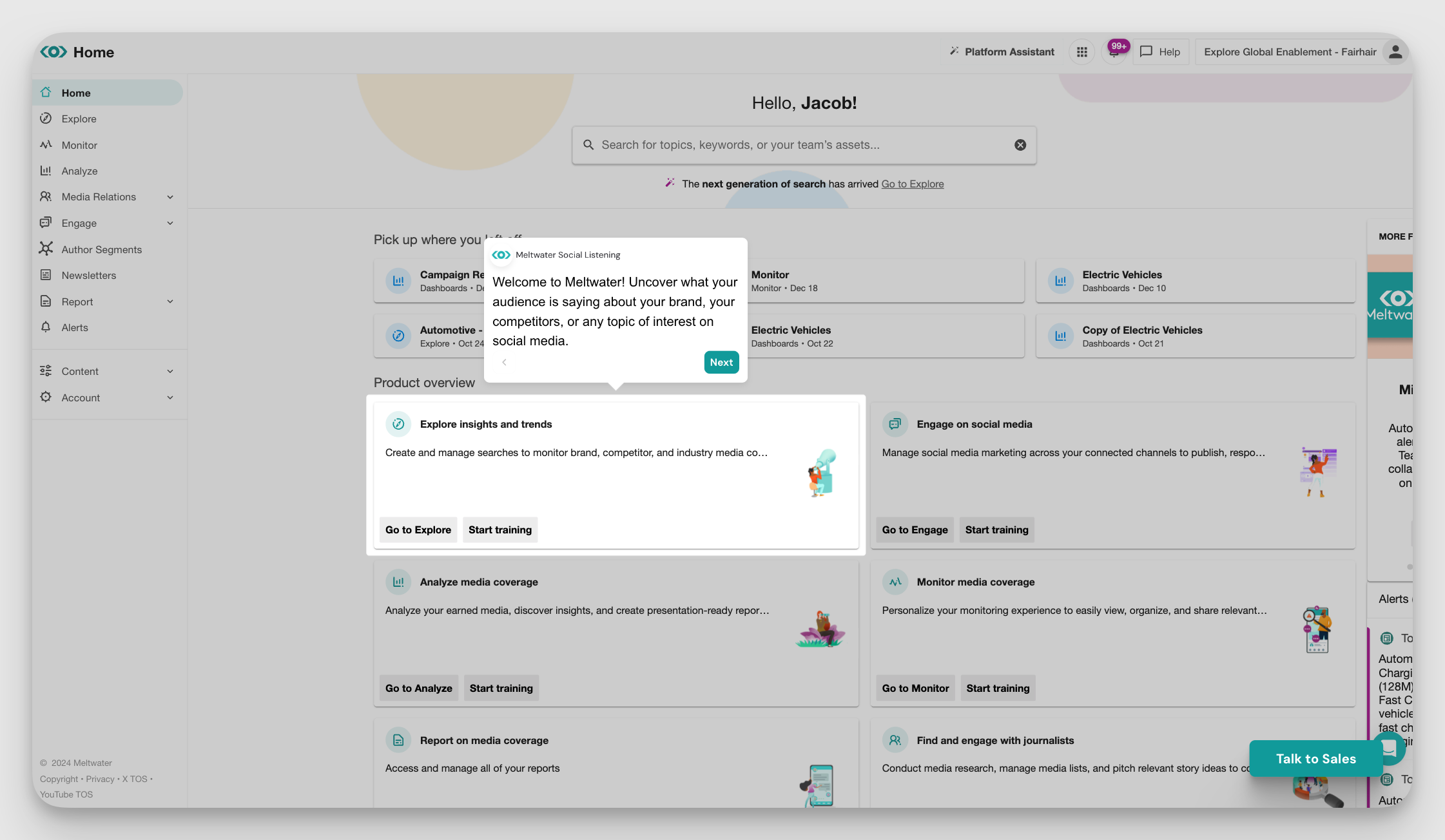
Key features of Meltwater
- Influencer identification: Meltwater uses real-time sentiment, visual analytics, and advanced AI to identify authentic influencers who align with your brand values. The tool provides performance data for all influencers so you can choose the right ones to amplify your campaigns.
- Competitive tracking: You can benchmark your brand against competitors on engagement, reach, and share of voice across social media, news, and other channels. With access to both historical and real-time data, you can spot trends, identify competitor strategies, and track market shifts at a global scale.
- PR measurement: Meltwater measures how widely your stories are reaching, how audiences are reacting, and what that coverage would have been worth in paid media. This helps you see the true impact of PR efforts, benchmark your visibility against competitors, and prove the ROI of earned media campaigns.
Strengths and limitations of Meltwater
Most suited for:
Meltwater is best for large enterprises, global brands, and PR agencies that rely heavily on earned media and PR impact and need to manage reputation across multiple regions.
Why choose Meltwater
Choose Meltwater if you’re looking for a comprehensive global media and competitive intelligence platform that goes beyond standard social listening.
YouScan
YouScan is a social listening tool that goes beyond tracking text mentions. Its AI can scan user-generated photos and videos to spot logos, objects, scenes, and activities. For brands, especially those competing with visually strong players in industries like fashion, food, or automotive, this level of visual tracking is especially valuable. Paired with sentiment analysis, it can reveal how often competitor products appear in user content, the contexts they’re associated with, and the emotions driving those interactions.
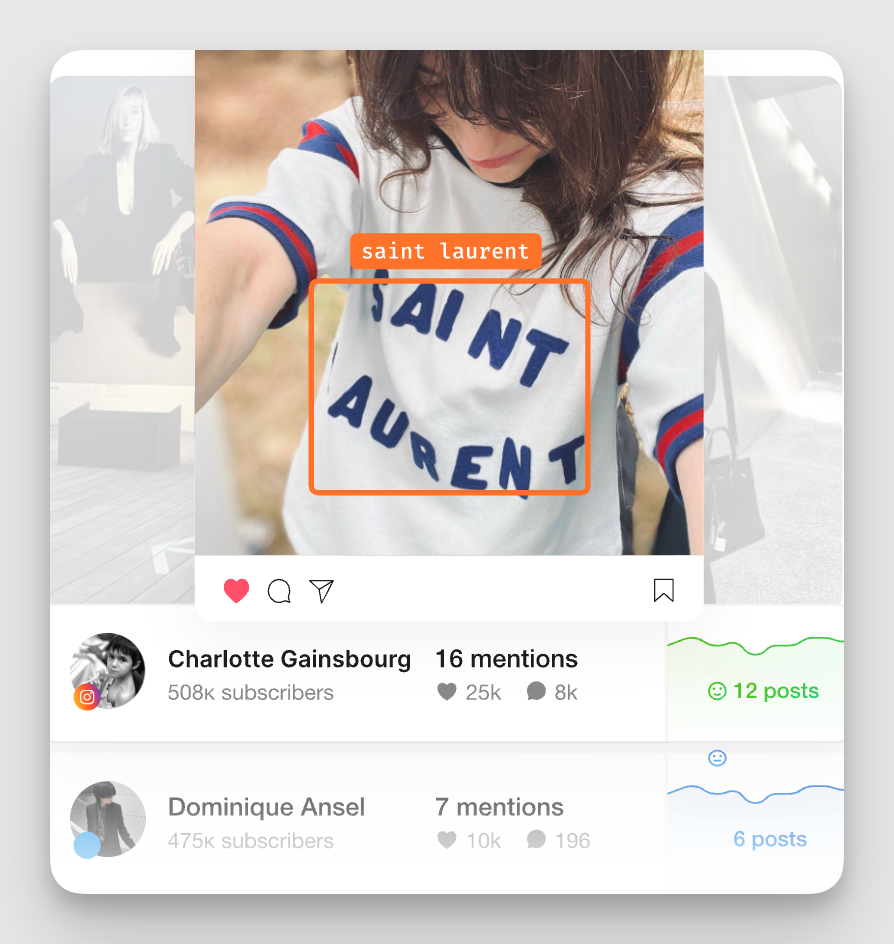
Key features of YouScan
- Visual social listening: YouScan goes beyond text-based mentions with its AI-powered image recognition, which can detect brand logos, products, or implicit references in online content–even when the brand name isn’t mentioned directly. It allows you to catch conversations about your competitors that traditional tools may miss.
- Logo detection: You can track where competitors’ logos appear across social posts, events, and media in real time, which can be useful for understanding which channels give them the most visibility.
- Scene analysis: YouScan can identify thousands of different settings, such as beaches, cafes, and concerts. It can help you analyze the environments in which competitor brands appear most frequently and the aesthetics connected with them. More importantly, it shows you why certain competitor aesthetics resonate with your audience.
- Sentiment tracking: The AI-powered sentiment analysis can give you an accurate view of customer perception. You can measure positive, negative, and neutral tones in both text and visual mentions, providing a deeper layer of brand reputation monitoring.
Strengths and limitations of YouScan
Most suited for:
YouScan is most valuable for medium to enterprise businesses that want to track how their brand is represented visually online.
Why choose YouScan
Choose YouScan if your brand relies heavily on visual storytelling and competitive monitoring. It can be a strong fit for industries with a high reliance on sponsorships, influencer marketing, or product aesthetics.
Mention
Mention is a real-time social media monitoring tool that helps brands track conversations, monitor competitors, and protect their reputation. The platform scans over 1 billion sources daily, including social media, blogs, forums, news outlets, and review sites. With customizable alerts and advanced filtering, Mention makes it easy for businesses to identify opportunities, manage crises, and stay ahead of competitors.
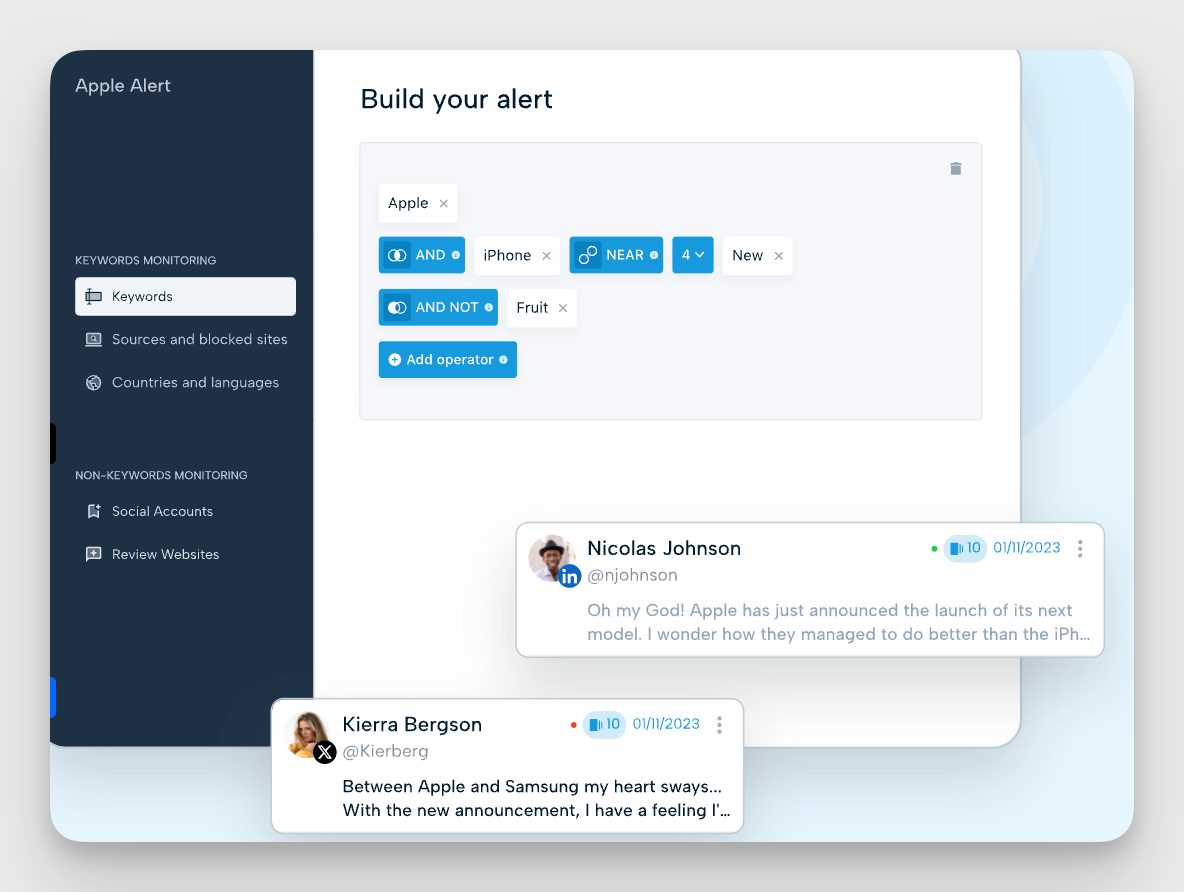
PPC & Advertising Intelligence Tools
SpyFu
SpyFu is a competitive analysis tool that can track your competitors’ paid and organic search strategies. It’s particularly strong in Google Ads insights, letting you see which keywords competitors are bidding on, what ad copy they use, and how their campaigns have evolved over time.
Reporting can be confusing and clunky with too many widgets that make it hard to configure. The data available is also from limited countries.
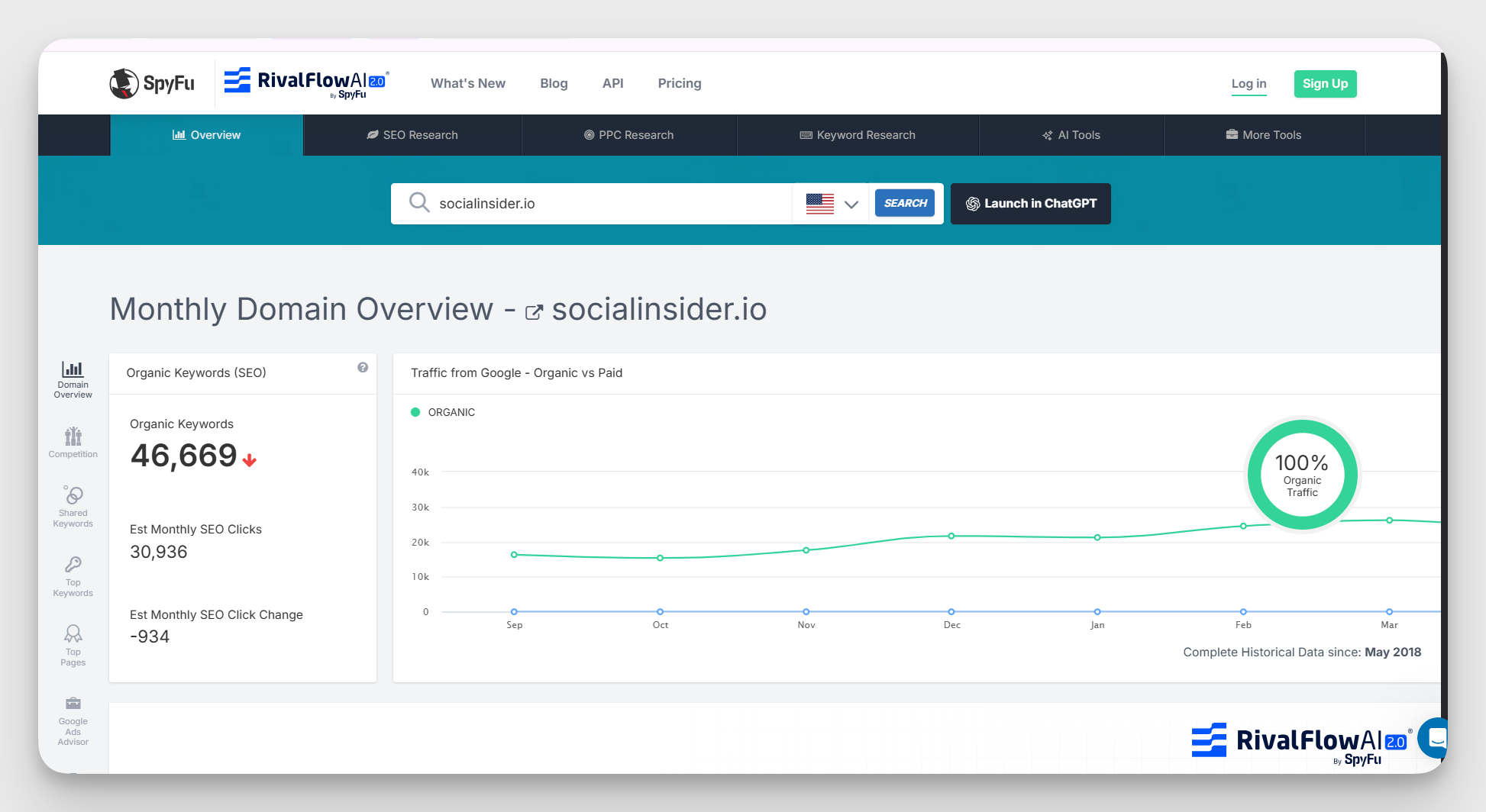
Key features of SpyFu
- AdWords Advisor: The AdWords Advisor scans your competitors’ strongest keywords and ad history to identify high-value keywords you’re not buying yet. It also points out negative match keywords to cut wasted ad spend, giving you smarter recommendations to improve ROI.
- Competitor ad variations: SpyFu’s ad history database lets you study competitors’ ad copy across years of campaigns. You can see which messages they tested, which ads ran the longest, and what copy they used the most. You can use the data to identify the most successful ad campaigns published by your competitors.
- Keyword grouping: SpyFu automatically organizes related keywords into groups, making it easier to structure your PPC campaigns. It also helps you align ads with search intent and optimize bidding strategies across categories instead of focusing on single keywords.
- PPC keyword research: SpyFu provides in-depth insights into keyword costs, search volume, impressions, and competitor overlap. With access to historical PPC data, you can uncover profitable keywords and track how competitors shift their budget over time.
Strengths and limitations of SpyFu
Most suited for
SpyFu works well for small to medium-sized businesses that are actively running Google Ads campaigns and want to tie their paid performance back to social insights.
Why choose SpyFu
SpyFu is one of the best-value tools for Google Ads competitive research. If you want to get an inside look at your competitor’s PPC campaigns, SpyFU can be a good tool at a cost-effective price point. But there are limited to zero social media intelligence capabilities.
PowerAdSpy
PowerAdSpy is an advertising intelligence tool designed to give marketers visibility into competitor ads across Facebook, Instagram, and other major platforms. With one of the largest ad databases in the industry, it allows you to uncover winning ad creatives, study engagement metrics, and refine your own campaigns with data-driven insights.
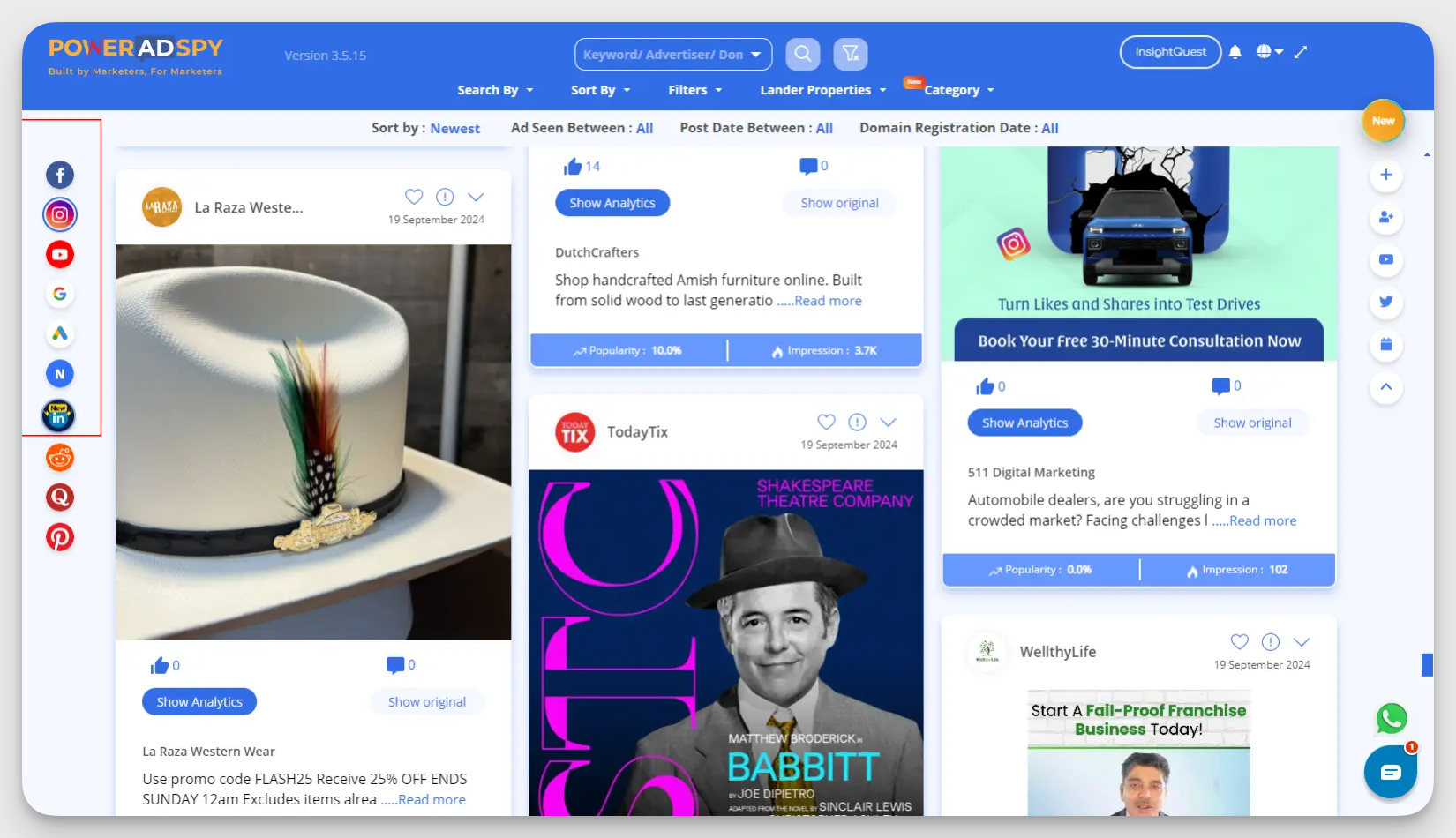
Key features of PowerAdSpy
- Facebook ad spy: PowerAdSpy specializes in uncovering competitor ads on Facebook. You can search by domain, advertiser, keyword, or CTA, and filter results by placement (news feed, side column, video feed). This helps you identify the exact strategies competitors are using and optimize your own campaigns accordingly.
- Instagram ad monitoring: The platform also tracks Instagram ads, including image and video formats. With insights into engagement metrics such as likes, shares, and comments, you can spot which creatives resonate most with audiences and apply those learnings to your campaigns.
- Native ad tracking: Beyond social platforms, PowerAdSpy tracks native ads across publishers and ad networks. By analyzing placements, creatives, and performance, you can uncover new opportunities outside traditional social channels and diversify your advertising mix.
- Affiliate marketing insights: One of the most effective channels for affiliate marketing is native advertising, and PowerAdSpy makes it easy to track what’s working for competitors’ ads. The platform lets you monitor ad campaigns across 17+ native ad networks, including Taboola, Outbrain, Bing, and Yahoo Gemini.
Strengths and limitations of PowerAdSpy
Most suited for:
Agencies and mid-to-large brands running high-volume paid campaigns who want to see what competitors are doing, assuming they have the budget and time to master the tool.
Why choose PowerAdSpy
If Facebook and Instagram ads are your main focus, PowerAdSpy gives you the biggest ad intelligence database out there. Just remember: it’s pricey, limited to a couple of platforms, and requires patience to actually use effectively.
SEO & Content Competitive Analysis Tools
SEMrush
SEMrush is an all-in-one SEO, content marketing, and paid ads platform widely used for competitive analysis. It helps businesses understand how their competitors drive traffic, where their keyword opportunities lie, and what strategies are working for them—making it a powerful choice for companies that want to win in search visibility.
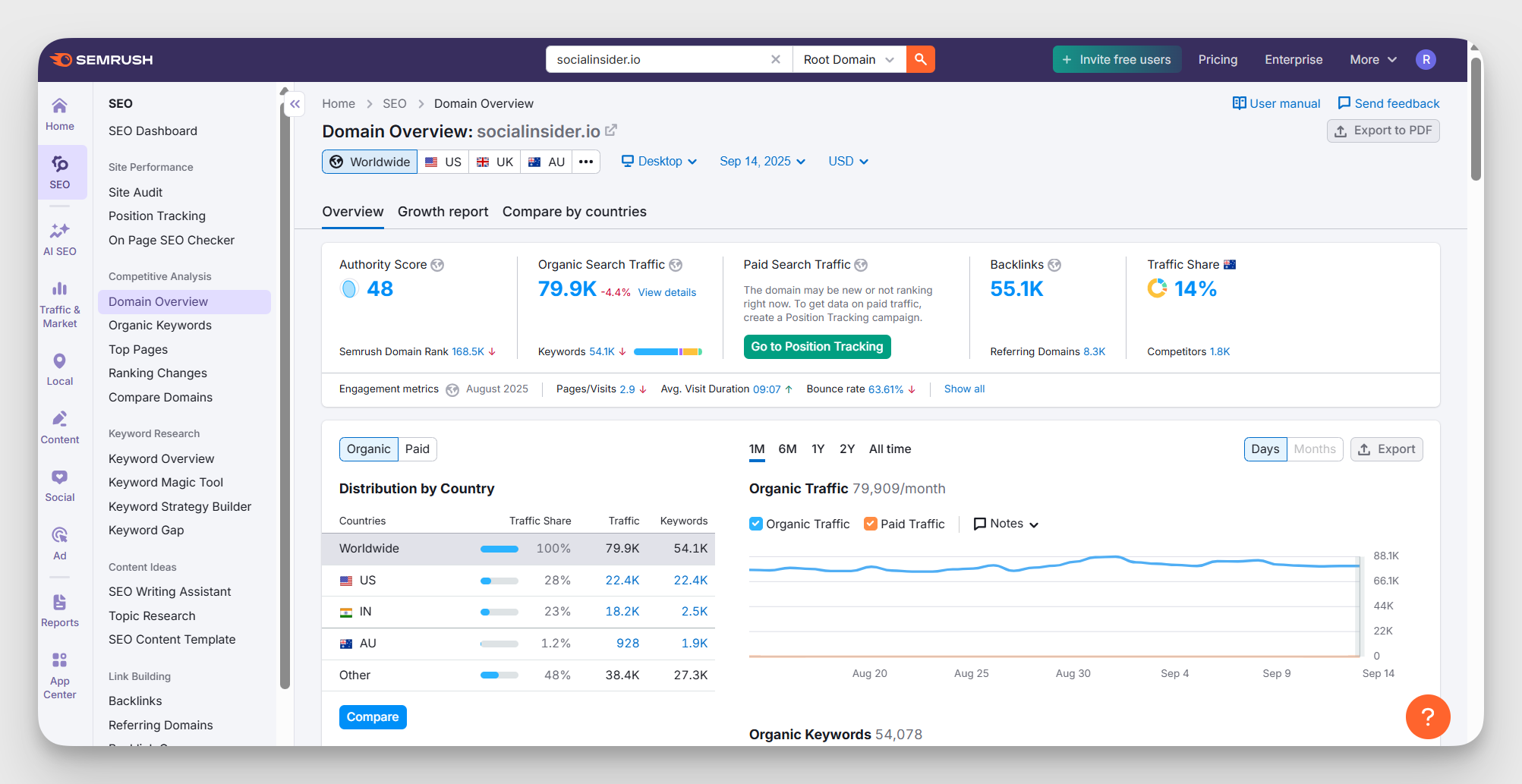
Key features of SEMrush
- Domain vs. Domain Comparison: You can benchmark your company site against up to five competitors at once to compare organic traffic, paid traffic, and backlinks. It can help you spot keyword gaps, audience overlaps, and market opportunities.
- Keyword difficulty analysis: Semrush helps you understand how tough it will be to outrank competitors for a keyword by calculating a Keyword Difficulty (KD) score from 0-100%. The score factors in metrics like domain authority, backlink profiles, and content strength of the websites currently ranking. A high KD means the keyword is heavily competitive, while a lower score signals easier opportunities. This makes it easier to prioritize keywords where your brand has a realistic chance of breaking through instead of wasting effort on impossible targets.
- SERP features tracking: Beyond just keyword rankings, Semrush shows which SERP features (like featured snippets, People Also Ask boxes, site links, or video carousels) appear for a keyword. It also reveals which competitors own those features. This can help you plan your content both for ranking and visibility. For example, you can use these insights to optimize content to win a snippet or aim for video placement.
Strengths and limitations of SEMrush
Most suited for:
SEMrush is most suited for medium to enterprise businesses with dedicated SEO teams that need advanced tools for keyword research and SEO tracking.
Why choose SEMrush
SEMrush can give you a detailed look at competitors’ keywords, backlinks, and SERPs, if you’re willing to pay for the privilege.
Ahrefs
Ahrefs is another popular all-in-one SEO tool with powerful competitive analysis. It offers a deep look into how competitors rank, where their traffic comes from, and which backlink strategies drive results. You can track rankings, identify keyword gaps, and even check the keywords your competitors are targeting for PPC campaigns.
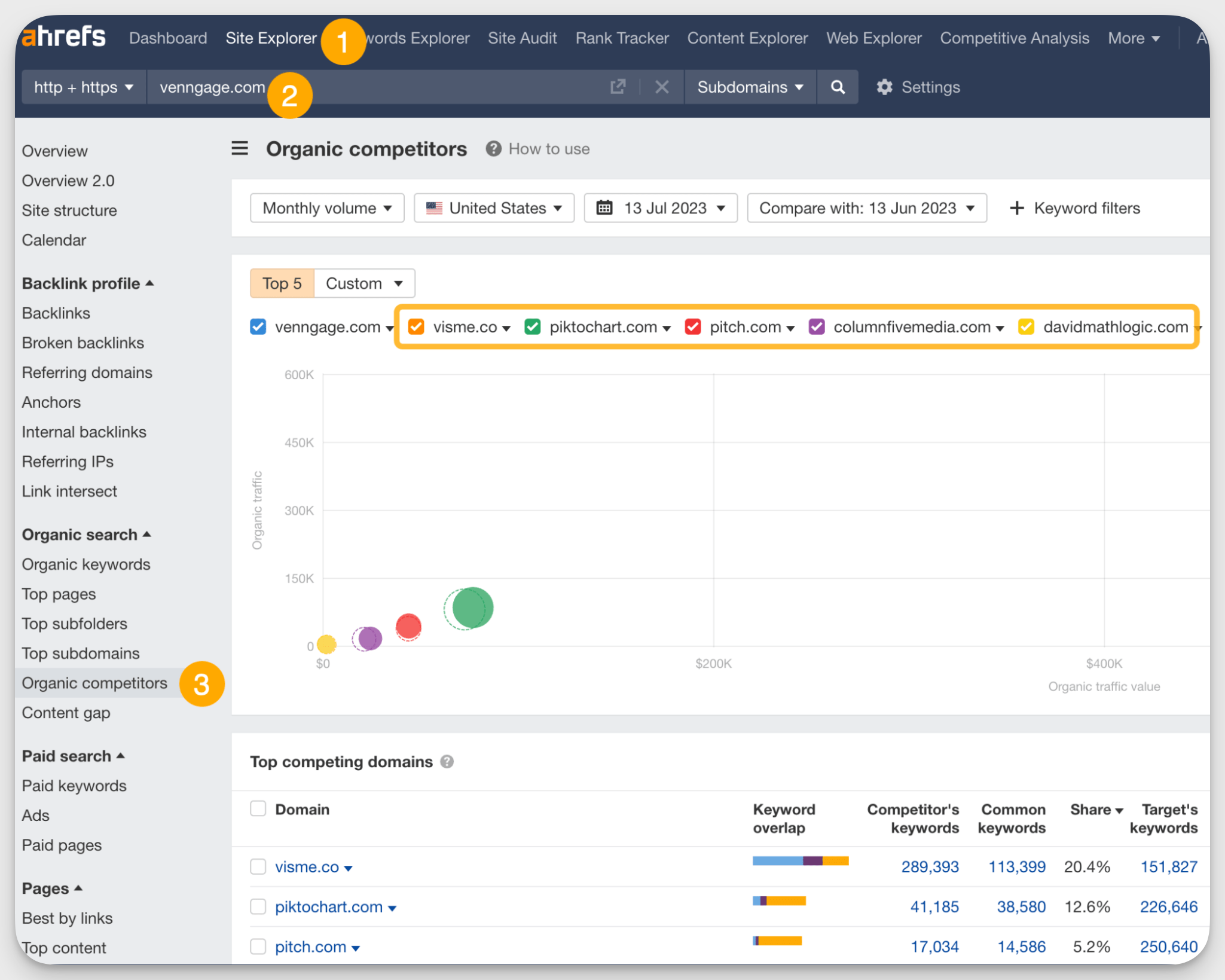
Key features of Ahrefs
- Site Explorer: Ahrefs’ Site Explorer can spy on competitor websites and show you their estimated organic traffic, top-performing pages, backlink sources, and paid keywords. You can use the data to analyze which keywords and pages are fueling your competitor’s growth.
- Content gap analysis: The tool highlights the keywords your competitors rank for, but you don’t. By comparing multiple competitor sites, you can uncover thousands of untapped keyword opportunities. It’s especially useful for planning content that directly challenges your competitors’ strongholds.
- Rank tracking: Ahrefs’ Rank Tracker monitors your keywords alongside your competitors. You can track visibility over time, see how your rankings shift compared to theirs, and identify markets where you’re falling behind. The data is available by country, device, and even SERP feature ownership (like AI overviews and featured snippets).
- Broken link building: Ahrefs makes it easy to find broken competitor pages that still attract backlinks. You can then recreate that content and reach out to reclaim those links for your site.
Strengths and limitations of Ahrefs
Most suited for:
Medium-sized businesses, SEO-focused brands, and agencies that can handle a steep learning curve and a higher price tag for solid backlink and competitor research.
Why choose Ahrefs
Ahrefs has one of the largest and most reliable backlink indexes available, which makes it especially useful for competitive analysis. Combined with traffic data, SERP insights, and content gap reports, it gives you a clear view of where competitors are gaining an edge.
Screaming Frog
Screaming Frog is a web crawling tool that allows you to analyze competitor websites in depth. Unlike other SEO competitor analysis tools like SEMrush and Ahrefs that focus on keyword or traffic data, Screaming Frog helps you see how competitors structure their sites, optimize content, and manage technical SEO elements.
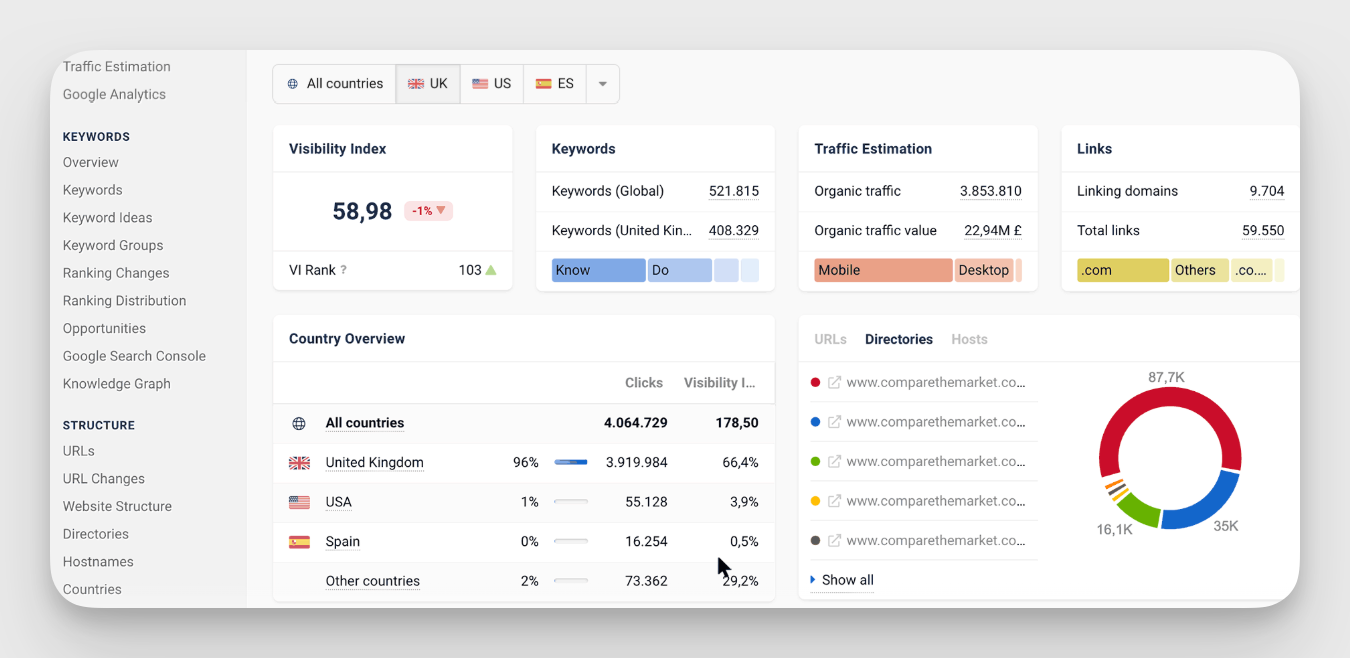
Key features of Screaming Frog
- Site crawling: Screaming Frog can crawl competitor websites to understand their URL structure, hierarchy, and page distribution. You can use the insights to analyze which pages they prioritize and how their content is organized for both users and search engines.
- Technical SEO analysis: You can analyze metadata, redirects, response codes, broken links, XML sitemaps, and other technical elements to identify gaps in your competitor’s websites.
- Competitor structure analysis: The tool also maps out internal linking, content categories, and site architecture. This allows you to see how competitors distribute authority across their pages and identify content strategies that drive organic traffic.
- Data export: Screaming Frog lets you export every detail from a crawl, including inlinks, outlinks, images, structured data, and content issues. Supported formats include CSV, Excel, and Google Sheets, making it easy to analyze and visualize competitor data. Integrations with Looker Studio allow automated exports for ongoing monitoring, so you can track competitor changes over time.
Strengths and limitations of Screaming Frog
Most suited for:
Screaming Frog works best for small businesses, SEO professionals, and agencies looking for in-depth competitor site audits without a high investment.
Why choose Screaming Frog
For technical competitor analysis, nothing matches Screaming Frog at its price point. It can help understand how competitors build, link, and optimize their websites to outperform them in search results.
How to choose the right competitive analysis tool for you
Here are the key factors to keep in mind when choosing a competitive tool for your brand or marketing agency.
Business size considerations
The type of tool you choose often depends on how big your company is and the scale of your marketing operations.
- Small businesses and startups: If you’re lean, you need something simple and affordable. So, core features like competitor monitoring, keyword tracking, and clear reporting are enough. Stay away from a tool that takes weeks to set up or only slows down your team.
- Mid-size teams and agencies: You’ll probably need access to deeper analytics, campaign comparisons, and audience insights. The key here is to find a tool that is sophisticated enough for strategy but not so bloated that it becomes an IT project.
- Enterprises: For enterprises, scale is everything. You’ll need tools with historical data, industry benchmarking, and integrations with CRM or BI tools.
Essential features checklist
Start by making a checklist of all the features that are essential to your business and the ones that would be nice to have. Here’s a breakdown of must-haves vs. nice-to-haves to guide your evaluation:
Must-haves
- Cross-platform competitor monitoring (social, search, news, forums)
- Real-time alerts to catch activity spikes and trends as they happen
- Reporting options that are flexible, shareable, and easy to digest
Nice-to-haves
- Visual analytics like logo detection in user content.
- Content gap analysis to see where competitors outperform you.
- Influencer and media tracking to identify who’s amplifying competitor messages.
- Automated content tagging for faster theme analysis.
- PR impact measurement to gauge sentiment and coverage quality.
Matching tool to team size and use case
Even with the right features in mind, the tool still needs to fit how your team actually works. A small in-house team won’t use a platform the same way a full-service agency does, and forcing a mismatch usually means wasted budget and unused features.
- Small, fast-moving teams: If you don’t have a dedicated analyst, look for tools that are intuitive and require minimal setup.
- Marketing teams and agencies: If you’re managing multiple campaigns, brands, or clients, you’ll need tools that balance depth with usability.
- Enterprises often require custom workflows, integrations, and support for larger datasets.
Budget considerations
Pricing for competitive analysis tools varies widely. Some platforms start at $30-$100 per month, while enterprise solutions can run into thousands.
- Entry-level budgets should focus on core tracking and reporting
- Mid-tier budgets can balance affordability with advanced insights and cross-channel monitoring
- Enterprise budgets should typically prioritize scale, global reach, and custom solutions
Integration with your existing tech stack
Finally, think about how well a competitive analysis tool fits into your current workflow. Insights are only useful if they connect with the systems your team already relies on.
- CRM integrations: You should be able to sync competitor insights directly with customer and sales data to give teams more context during outreach.
- Collaboration tools: Any competitor alerts should be sent automatically to team channels for faster awareness and response.
- Analytics dashboards: The tool should also allow you to feed competitive data into visualization platforms to track trends over time and share findings with stakeholders.
Final thoughts
As I’ve seen firsthand, many competitive analysis tools can be bloated with features that will never get used or stripped-down options that barely scratch the surface. The real challenge is finding a tool with the right balance of features that actually fits your goals, team size, and budget so you can turn insights into action without paying for a dashboard full of fluff
If your focus is on social media benchmarking and competitor intelligence, Socialinsider is a strong choice. It provides deep, cross-channel insights designed to help marketers and agencies stay ahead of the competition.
Analyze your competitors in seconds
Track & analyze your competitors and get top social media metrics and more!
You might also like
Improve your social media strategy with Socialinsider!
Use in-depth data to measure your social accounts’ performance, analyze competitors, and gain insights to improve your strategy.



